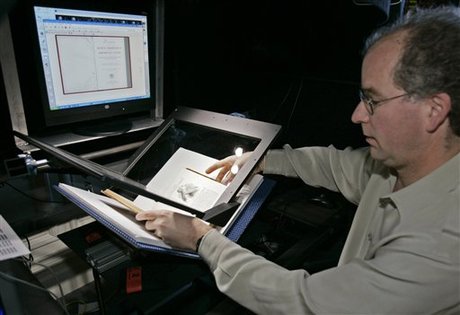Google, Publishers Shelve Book-Scanning Suit

Google and major book publishers have settled a lengthy legal battle over digital copyrights, but a bigger dispute still looms with thousands of authors who allege that Google is illegally profiting from their works.
The truce announced Thursday ends a federal lawsuit filed in 2005 by several members of the Association of American Publishers after Google Inc. began stockpiling its Internet search index with digital duplicates of books scanned from libraries.
Google has maintained that its scanning is covered by fair-use provisions of copyright law, although it offered to remove specific books from its index upon request. It also showed only snippets of the copyrighted books unless permission was given to show more.
Publishers and authors, however, insisted that Google needed explicit permission from them before making the digital copies, let alone showing even snippets of text from the books on Google's website.
Google worked out a $125 million settlement with publishers and authors in 2008, only to have a federal judge in New York reject it after the U.S. Justice Department and other critics contended that it would thwart competition in the rapidly growing digital book market and flout U.S. copyright law.
One of the reasons that settlement unraveled was because it would have given Google broad authority to copy books, unless an author or publisher notified the company not to make the duplicate.
Terms of the new settlement weren't divulged, but it won't require court approval because its reach will be limited to the parties signing on.
The scaled-down agreement with publishers is likely to make more copyright-protected books available online. Most of those will be sold through Google Play, a digital store. Publishers will have the right to release digital copies of their books in Google Play or remove them from Google's search index entirely.
That's not a major change in how Google has been handling matters with the lawsuits pending, but publishers now feel comfortable enough with the system to set up an official framework, Tom Allen, president of the publishers' group, said in an interview.
Google, which is based in Mountain View, California, will also provide publishers with a digital copy of a scanned book upon request.
The settlement "shows that digital services can provide innovative means to discover content while still respecting the rights of copyright holders," Allen said in a statement.
Both Google and the publishers may have been more motivated to figure out a way to work together with so many more people reading books on digital devices than just a few years ago. Google has been playing a more important role in that transition since it started selling a tablet computer, the Nexus 7, in July. The tablet is set up to download books and other digital content from Google Play.
Although the sparring over Google's effort to create the world's largest digital library appears to be over on one front, a lawsuit filed by the Authors Guild remains in the way of Google's ambitious plans to digitize more than 130 million of books sitting on library shelves around the world.
The authors' suit, which came before the publishers' complaint, raises thornier issues and threatens Google with a huge bill. The authors are seeking $750 in damages for every copyrighted book that Google has scanned over the past eight years.
Despite the lawsuits, Google has made digital copies of more than 20 million books so far. The copyrights on many of those books have already expired, making them fair game and not part of any infringement damages that might be awarded. Even if just one-quarter of the books scanned so far by Google are protected by copyrights, the company would be liable for nearly $4 billion if a court sides with the authors.
"The publishers' private settlement, whatever its terms, does not resolve the authors' copyright infringement claims against Google," the Authors Guild said in a statement Thursday. "Google continues to profit from its use of millions of copyright-protected books without regard to authors' rights, and our class-action lawsuit on behalf of U.S. authors continues."
In an interview, Authors Guild lawyer Michael Boni said the publishers agreement made him "cautiously optimistic" that a settlement of his case could be reached before it goes to trial.
But he also stressed the authors' issues are much different than the publishers' concerns. "We're really on a separate motor at this point," Boni said.
Google declined to comment Thursday on the legal dispute with the authors.
In May, U.S. District Judge Denny Chin in New York granted the authors' lawsuit class certification, meaning the case would cover all authors, even if they are too small to hire their own lawyers to sue Google. Chin also rejected Google's attempt to get the case thrown out.
The authors' suit is in a holding pattern until an appeals court rules on Google's attempt to strip the authors of their status as a united class.
One of the biggest sticking points in the authors' case revolves around the rights to millions of out-of-print books that are still protected by copyright but whose writers' whereabouts are unknown.
The prospect that Google could gain a digital monopoly on these so-called "orphan works" was one of the main reasons that the Justice Department and other objectors urged Chin to scotch the earlier $125 million settlement with publishers and authors. Chin rejected the agreement in 2010.
Google's stock rose $5.55 to close Thursday at $768.05.
The publishers who brought the lawsuit were The McGraw-Hill Cos.; Pearson PLC's Penguin Group and Pearson Education; John Wiley & Sons Inc. and CBS Corp.'s Simon & Schuster.



